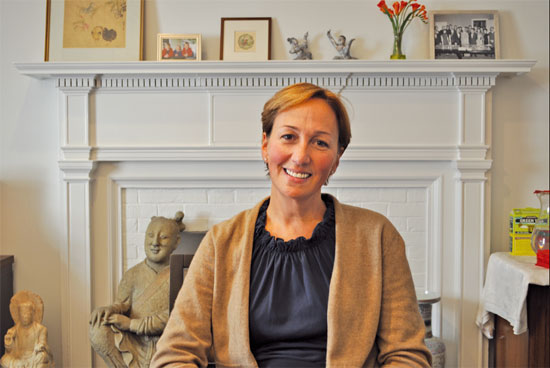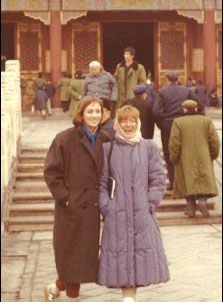Building Cross-Culture Bonds
Updated: 2013-02-22 12:05
By Caroline Berg (China Daily)
|
||||||||
|
Sara Judge McCalpin, at her China relic-filled office, says she hopes the United States should encourage more people to learn foreign languages to enhance understanding. Caroline Berg / China Daily |
Sara Judge McCalpin will celebrate her 8th anniversary on March 1 as president of the China Institute, almost 31 years after her first visit to Beijing, China Daily's Caroline Berg reports from New York.
The children giggled with glee and shouted "Foreigner! Foreigner!" as they ran after Sara Judge McCalpin, who was taking a morning run around Weiming Lake on the Peking University campus.
"There were many old people doing tai chi ... People looked at me patiently, some smiled with each other as I passed..." McCalpin wrote in her diary, along with the observation about the children following her. The date of the entry was Aug 30, 1982. Two days earlier, McCalpin arrived in the Chinese capital on the start of a life-long China connection.
On March 1, almost 31 years since that diary entry and her first trip to China, she will celebrate her 8th anniversary as president of the China Institute in New York.
"We have had this mission since we were founded in 1926 of teaching Americans about China and certainly that mission was relevant in 1926, but I think it's even more relevant today," the 53-year-old McCalpin said. "The US-China relationship is arguably the most important relationship in the world."

McCalpin's career at the China Institute began in 2004 when she lent her consulting expertise and helped launch the annual Executive Summit program, which brings together CEOs from China and the US to discuss topics of mutual interest.
Due to the program's success, the Michigan native was asked to step in as an interim president. Within six weeks, McCalpin said she realized her job was ideal.
"To have studied the language, culture, history, philosophy, art and then to have all that be part of my daily work was really gratifying," McCalpin said.
Apart from establishing the Executive Summit program, the Princeton University graduate has helped expand the institute's Chinese language programs for ages three to adult.
"Particularly given the interest in Chinese language learning in this country right now, our Chinese language programs for children have been really popular," McCalpin said.
Among the education programs developed during her presidency, the institute offers high school summer study programs in China. For 2013, upon the success of the Beijing program, the institute has unveiled new language immersion opportunities in Yunnan province and a three-city language immersion and travel program to Beijing, Nanjing and Suzhou.
"I felt so strongly because of my own experience in China how important that time was," McCalpin said about developing the summer abroad program.
China has remained a constant root for McCalpin since her first Chinese history course at Princeton in 1979. Between 1982 and 1986, McCalpin underwent her own China adventures. After her first introduction to a Tang Dynasty (AD 618-907) poem in her Princeton Chinese history class, McCalpin's affair with China was set.
"I was just totally smitten with the language," McCalpin said.
McCalpin took a 10-week intensive Chinese language course at the University of Michigan and realized then that "there was really no turning back."
With the encouragement of her professors at Princeton, McCalpin enrolled in a study abroad program in Beijing for after her graduation in 1982.
"China's mainland was still just opening up and most students who wanted to pursue Chinese language learning in Asia would go to Taiwan," McCalpin said. "But I really wanted to go to Beijing."
Although she was one of only a few Americans in her program, or in Beijing, the 22-year-old with a shoulder-length brown-haired bob managed to blend in by wearing navy blue and green Mao suits and riding a bicycle.
"I felt pretty free," McCalpin said, "other than going over to Chinese friends' homes, which there was still this sort of urban neighborhood committee system."
During her time at Peking University, a guard worked in the Friendship Hotel where McCalpin lived and kept track of when she came in and went out, and also who she brought to her room for a cup of tea.
Among the Chinese friends the she made was a retired Peking University professor in his 80s. The two met at a gathering of Princeton Club in Beijing, which McCalpin and a group of friends started. The gentleman attended because he had received a PhD in politics from Princeton in 1939.
"It was a real lesson for me on the dignity of the human spirit because he had been through very difficult times during the Cultural Revolution," McCalpin said. "Yet he was still hopeful and optimistic and pleased with the direction in which China is headed."
|
Sara Judge McCalpin (left) and her mother, Nancy Cordiner Judge, at the Forbidden City in 1984. Richard D. Judge / For China Daily |
McCalpin would spend afternoons with her friend and his family "eating, and eating and eating, more and more" and talking.
"I listened to his stories about his time in school and his time raising pigs during the 'cultural revolution' (1966-76)," she said, "and his hopes for his children and grandchildren."
Meanwhile, McCalpin secured a job working for another Princeton alum, Virginia A. Kamsky, for the newly formed consulting firm Kamsky Associates. Apart from a quick trip home to renew her visa, McCalpin remained in Beijing until 1986.
"It felt a bit like being a pioneer," she said. "Culturally, it was so exciting to be using another language."
In the 1980s, very few Chinese spoke English. McCalpin and her team of 20-something-year-old women had to rely on their Chinese language skills.
"I still remember being petrified when I first had to answer the phone in Chinese," McCalpin said. "Then you really feel you've got to be firing on all pistons because otherwise you can't understand what's being said."
When Ronald Reagan made his first and only presidential trip to China in 1984, McCalpin wrote him a letter.
"I figured he was probably getting a very high level of discourse about China and what was going on in China," she said. "I thought it could be quite interesting for him to hear about someone who was working at a lower level for a small start-up in China."
About two weeks before Reagan arrived, McCalpin received a phone call from the US embassy informing her that the president and first lady Nancy Reagan would like to meet her.
Although McCalpin said the meeting lasted about three minutes, she still recalls the experience fondly.
"I told them about what it was like to live in a socialist country, about some of the things I missed about the US, but also I told them about the warmth of the Chinese people," she said.
McCalpin told Reagan that she hoped the US could encourage more people to study languages such as Chinese because this is where, at a human level, she believes you can gain understanding between two countries.
Although McCalpin returned to New York in 1986, she knew China would remain a constant in her life.
When she revisited China 12 years later, McCalpin said she was struck by the palpable energy. She perceived a difference in how Chinese people carried themselves more upright.
"I was there just at the tail end of a very difficult time in China's history," McCalpin said. "When I went back, it was just a much more hopeful place."
McCalpin has since lost count of the number of visits she's made. She said she usually travels to China three to four times a year, and on occasion with her children.
"I took 12 years out of my career to raise three amazing children," McCalpin said.
With a daughter in her senior year of high school, a son at Princeton and another son who graduated from college, McCalpin is back to work at the China Institute.
She acknowledged how the establishment has been somewhat "sleepy" at its headquarters on the Upper East Side in Manhattan, and now she is focused on outreach.
"We've seen the demand [for Chinese language learning] skyrocket," McCalpin said. "I'm hoping we continue to expand the number of students we can service."
Since space in the four-story, red-brick institute - a family's home during the early 20th century - has largely run out, the organization is forming partnerships at schools, including the Dalton School in Manhattan and White Plains High School just north of New York City.
The institute also focuses on teacher training and professional development. It helps schools that are seeking to establish Chinese language programs, including interviewing prospective Chinese teachers, as well as providing advice on curriculum and book selection.
The institute has more than 1,000 members. McCalpin's former employer, Virginia A. Kamsky, is chairwoman of the board of trustees, which includes the co-founder of Hainan Airlines, Chen Guoqing, and Julie Nixon Eisenhower, a daughter of former President Richard Nixon.
The institute receives financial support from membership fees, event admissions, federal grants and an annual gala.
"It's been really gratifying to see," McCalpin said about the city and state government interest in the institute. "Although the economic downturn has made [support] more difficult, I think everybody's interested in China for a whole variety of reasons."
Whether it is at a preschool level or an executive level, McCalpin said she and the institute work solely to build cross-cultural bonds.
"I believe that if we can find the common ground on global issues, and on a cultural level, then you build the friendships," McCalpin said. "So when the tough issues arise, you've got the friendship and the understanding there. It makes the tough issues easier to resolve".
Contact the writer at carolineberg@chinadailyusa.com

 In Photos: 7.0-magnitude quake hits Sichuan
In Photos: 7.0-magnitude quake hits Sichuan
 Li Na on Time cover, makes influential 100 list
Li Na on Time cover, makes influential 100 list
 FBI releases photos of 2 Boston bombings suspects
FBI releases photos of 2 Boston bombings suspects
 World's wackiest hairstyles
World's wackiest hairstyles
 Sandstorms strike Northwest China
Sandstorms strike Northwest China
 Never-seen photos of Madonna on display
Never-seen photos of Madonna on display
 H7N9 outbreak linked to waterfowl migration
H7N9 outbreak linked to waterfowl migration
 Dozens feared dead in Texas plant blast
Dozens feared dead in Texas plant blast
Most Viewed
Editor's Picks

|

|

|

|

|

|
Today's Top News
Live report: 7.0-magnitude quake hits Sichuan, heavy casualties feared
Boston suspect cornered on boat
Cross-talk artist helps to spread the word
'Green' awareness levels drop in Beijing
Palace Museum spruces up
First couple on Time's list of most influential
H7N9 flu transmission studied
Trading channels 'need to broaden'
US Weekly

|

|









